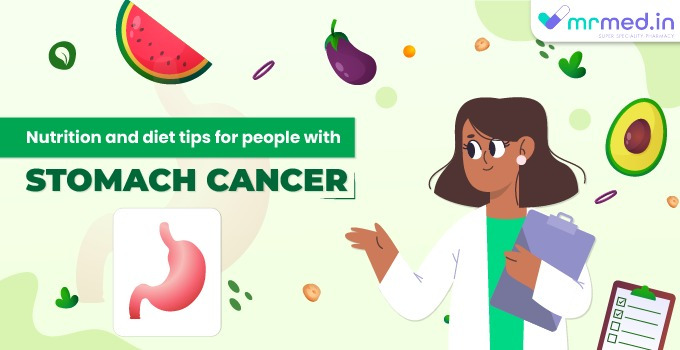The lining of the stomach is where stomach cancer, sometimes referred to as gastric cancer, first appears. It is the third biggest cause of cancer-related fatalities and the fifth most prevalent cancer in the world. The stomach cancer survival rate after five years is 20%.
Although there is no known direct cause of stomach cancer, there are a number of things that can make someone more likely to get the illness. These include smoking, eating a diet rich in smoked, pickled, or salty foods, and having had stomach surgery in the past.
In addition to nausea, vomiting, indigestion, stomach pain, and accidental weight loss, stomach cancer symptoms might also include these.
Diet and nutrition are crucial to the overall health and wellness of those who have stomach cancer. Following are some dietary and nutrition advice for people with stomach cancer:
Eat small, frequent meals: Instead of three large meals throughout the day, people with stomach cancer might find it simpler to eat small, frequent meals. This can lessen satiety and discomfort sensations.
Pick nutrient-rich foods: People with stomach cancer can maintain their energy levels and avoid malnutrition by consuming a variety of nutrient-rich foods. Lean protein, whole grains, fruits, and vegetables are some examples of nutrient-dense foods.
Avoid spicy and acidic foods: Since they might irritate the stomach lining and make stomach cancer symptoms worse. It is better to stay away from these kinds of foods and opt for softer alternatives.
Stay Hydrated: Maintaining adequate hydration is crucial for those who have stomach cancer since it can assist to prevent dehydration and enhance digestion. The best options are water, herbal teas, and broths.
Nutritional Supplements: If you have stomach cancer, you might want to think about taking nutritional supplements to make sure you're getting all the nutrients you need. This can include protein, vitamin, and mineral supplements.
It's crucial for individuals with stomach cancer to collaborate closely with their medical team to create a personalised dietary plan that takes into account their particular requirements and preferences. A licensed dietitian might be able to offer further direction and help in some situations.
In conclusion, diet and nutrition are very important in the treatment of stomach cancer. People with stomach cancer can maintain their health and wellness and enhance their general quality of life by heeding these recommendations and cooperating closely with their medical team. You should visit a doctor as soon as possible if you see any stomach cancer symptoms. Early detection and treatment have a significant positive impact on outcomes and raise the likelihood of a full recovery.




